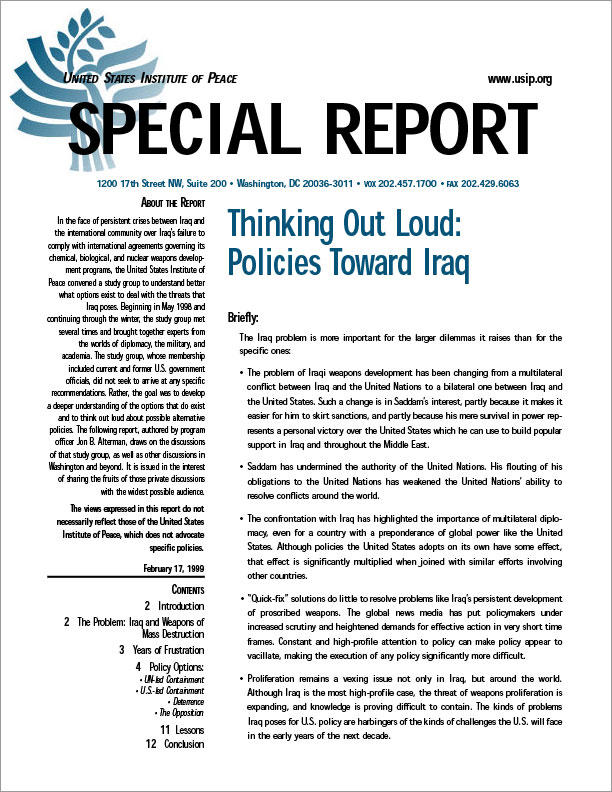In the face of persistent crises between Iraq and the international community over Iraq's failure to comply with international agreements governing its chemical, biological, and nuclear weapons development programs, the United States Institute of Peace convened a study group to understand better what options exist to deal with the threats that Iraq poses.

Summary
The Iraq problem is more important for the larger dilemmas it raises than for the specific ones:
- The problem of Iraqi weapons development has been changing from a multilateral conflict between Iraq and the United Nations to a bilateral one between Iraq and the United States. Such a change is in Saddam's interest, partly because it makes it easier for him to skirt sanctions, and partly because his mere survival in power represents a personal victory over the United States which he can use to build popular support in Iraq and throughout the Middle East.
- Saddam has undermined the authority of the United Nations. His flouting of his obligations to the United Nations has weakened the United Nations' ability to resolve conflicts around the world.
- The confrontation with Iraq has highlighted the importance of multilateral diplomacy, even for a country with a preponderance of global power like the United States. Although policies the United States adopts on its own have some effect, that effect is significantly multiplied when joined with similar efforts involving other countries.
- "Quick-fix" solutions do little to resolve problems like Iraq's persistent development of proscribed weapons. The global news media has put policymakers under increased scrutiny and heightened demands for effective action in very short time frames. Constant and high-profile attention to policy can make policy appear to vacillate, making the execution of any policy significantly more difficult.
- Proliferation remains a vexing issue not only in Iraq, but around the world. Although Iraq is the most high-profile case, the threat of weapons proliferation is expanding, and knowledge is proving difficult to contain. The kinds of problems Iraq poses for U.S. policy are harbingers of the kinds of challenges the U.S. will face in the early years of the next decade.
About the Report
In the face of persistent crises between Iraq and the international community over Iraq's failure to comply with international agreements governing its chemical, biological, and nuclear weapons development programs, the United States Institute of Peace convened a study group to understand better what options exist to deal with the threats that Iraq poses. Beginning in May 1998 and continuing through the winter, the study group met several times and brought together experts from the worlds of diplomacy, the military, and academia. The study group, whose membership included current and former U.S. government officials, did not seek to arrive at any specific recommendations. Rather, the goal was to develop a deeper understanding of the options that do exist and to think out loud about possible alternative policies. This report, authored by program officer Jon B. Alterman, draws on the discussions of that study group, as well as other discussions in Washington and beyond. It is issued in the interest of sharing the fruits of those private discussions with the widest possible audience.
The views expressed in this report do not necessarily reflect those of the United States Institute of Peace, which does not advocate specific policies.